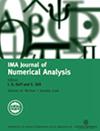断裂多孔介质输运问题的整体和局部时间步进解耦算法
IF 2.3
2区 数学
Q1 MATHEMATICS, APPLIED
引用次数: 0
摘要
本文旨在为断裂多孔介质中的线性平流-扩散方程开发高效的数值算法。本文考虑了一种简化的断裂模型,将断裂视为子域之间的界面,并考虑了断裂与周围多孔介质之间的相互作用。该模型采用后向欧拉上风混合有限元法离散化,其中通量变量代表平流和扩散通量。建立了完全离散耦合问题在空间和时间上的存在性、唯一性和最佳误差估计。此外,为了便于在断裂界面和子域中采用不同的时间步骤,利用全局-时间、非重叠域分解推导出离散问题的两种隐式迭代求解器。第一种方法基于随时间变化的 Steklov-Poincaré 算子,而第二种方法则采用带有 Ventcel-Robin 传输条件的优化 Schwarz 波形松弛(OSWR)方法。每种方法都制定了一个离散时空界面系统,并以可能可变的时间步长进行迭代求解。此外,还证明了基于 OSWR 方法与符合时间网格的收敛性。最后,还给出了二维数值结果,以验证单片求解器的最佳收敛阶次,并说明两种解耦方案在高佩克莱特数问题上的局部时间步进性能。本文章由计算机程序翻译,如有差异,请以英文原文为准。
Monolithic and local time-stepping decoupled algorithms for transport problems in fractured porous media
The objective of this paper is to develop efficient numerical algorithms for the linear advection-diffusion equation in fractured porous media. A reduced fracture model is considered where the fractures are treated as interfaces between subdomains and the interactions between the fractures and the surrounding porous medium are taken into account. The model is discretized by a backward Euler upwind-mixed hybrid finite element method in which the flux variable represents both the advective and diffusive fluxes. The existence, uniqueness, as well as optimal error estimates in both space and time for the fully discrete coupled problem are established. Moreover, to facilitate different time steps in the fracture-interface and the subdomains, global-in-time, nonoverlapping domain decomposition is utilized to derive two implicit iterative solvers for the discrete problem. The first method is based on the time-dependent Steklov–Poincaré operator, while the second one employs the optimized Schwarz waveform relaxation (OSWR) approach with Ventcel-Robin transmission conditions. A discrete space-time interface system is formulated for each method and is solved iteratively with possibly variable time step sizes. The convergence of the OSWR-based method with conforming time grids is also proved. Finally, numerical results in two dimensions are presented to verify the optimal order of convergence of the monolithic solver and to illustrate the performance of the two decoupled schemes with local time-stepping on problems of high Péclet numbers.
求助全文
通过发布文献求助,成功后即可免费获取论文全文。
去求助
来源期刊
CiteScore
5.30
自引率
4.80%
发文量
79
审稿时长
6-12 weeks
期刊介绍:
The IMA Journal of Numerical Analysis (IMAJNA) publishes original contributions to all fields of numerical analysis; articles will be accepted which treat the theory, development or use of practical algorithms and interactions between these aspects. Occasional survey articles are also published.

 求助内容:
求助内容: 应助结果提醒方式:
应助结果提醒方式:


